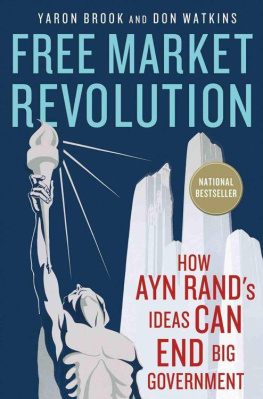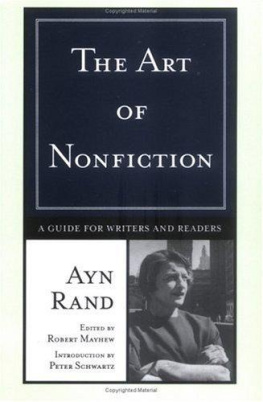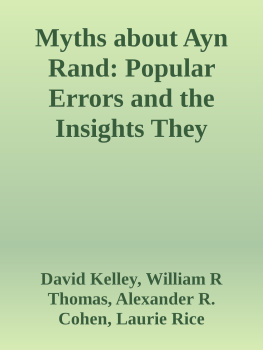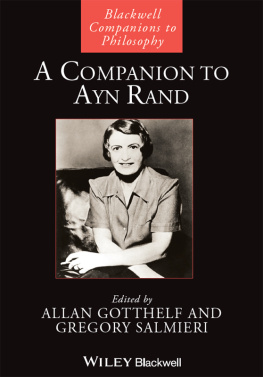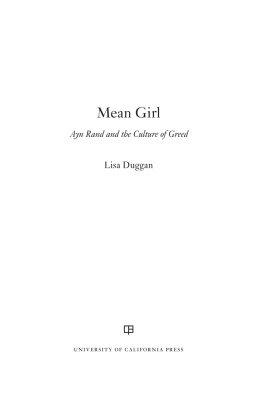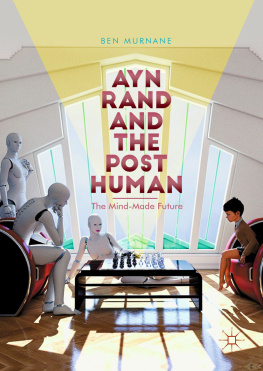FREE
MARKET
REVOLUTION
HOW AYN RANDS IDEAS CAN END BIG GOVERNMENT
FREE
MARKET
REVOLUTION
HOW AYN RANDS IDEAS CAN END BIG GOVERNMENT
YARON BROOK AND DON WATKINS


FREE MARKET REVOLUTION
Copyright , Ayn Rand Institute, 2012.
All rights reserved.
First published in 2012 by PALGRAVE MACMILLAN in the United Statesa division of St. Martins Press LLC, 175 Fifth Avenue, New York, NY 10010.
Where this book is distributed in the UK, Europe and the rest of the world, this is by Palgrave Macmillan, a division of Macmillan Publishers Limited, registered in England, company number 785998, of Houndmills, Basingstoke, Hampshire RG21 6XS.
Palgrave Macmillan is the global academic imprint of the above companies and has companies and representatives throughout the world.
Palgrave and Macmillan are registered trademarks in the United States, the United Kingdom, Europe and other countries.
ISBN: 978-0-230-34169-2
Library of Congress Cataloging-in-Publication Data
Brook, Yaron.
Free market revolution : how Ayn Rands ideas can end big government / by Yaron Brook and Don Watkins.
p. cm.
Includes index.
ISBN 978-0-230-34169-2
1. Free enterprise. 2. Capitalism. 3. Self-interest. 4. Rand, Ayn. I. Watkins, Don, 1982 II. Title.
HB95.B76 2012
330.122dc23
2012002899
A catalogue record of the book is available from the British Library.
Design by Letra Libre Inc.
First edition: September 2012
10 9 8 7 6 5 4 3 2 1
Printed in the United States of America.
Note: Some material from has appeared in a somewhat different form in the authors Forbes.com column, The Objectivist.
CONTENTS
To Revital Brook and Kate Watkins
for your unwavering support and infinite patience
ACKNOWLEDGMENTS
ONE REASON JAMES MADISON INITIALLY DID NOT WANT TO include a bill of rights in the Constitution was because he worried that by naming some rights the government could not infringe upon, people would draw the conclusion that these were the only rights the government could not infringe upon. We can sympathize. In acknowledging those who made this book possible, we are left with the desire to include our own Ninth Amendment: The failure to include someone in these acknowledgments should not be construed to deny or disparage his contribution.
Our debts to historys great thinkers run deep, and, for the record, this book would not exist but for the achievements of men like Aristotle, John Locke, Adam Smith, the Founding Fathers, and Ludwig von Mises.
Our greatest intellectual debt is, of course, to Ayn Rand. Her philosophy has shaped virtually every aspect of our work and our lives. We hope this book does her justice.
It would be impossible to name every Rand scholar whose work we have profited from, but we would be remiss not to tip our hats to Andrew Bernstein, Harry Binswanger, Eric Daniels, Eric Dennis, Allan Gotthelf, John David Lewis, Gregory Salmieri, Rob Tarr, C. Bradley Thompson, and Darryl Wright. In particular we want to recognize Tara Smith for her work on Rands virtues, Peter Schwartz for his many lectures on Rands analysis of altruism, and Robert Mayhew for editing a series of outstanding books on Ayn Rands fiction. All of these individuals have contributed to our understanding of Ayn Rands ideas, and we draw on their work throughout this book.
We have also benefited from the work of a number of non-Objectivist economists and economic commentators including Peter Boettke, Russell Roberts, Peter Schiff, George Selgin, Thomas Sowell, William Voegeli, Lawrence H. White, and George Will, among many others.
We would like especially to thank our colleagues at the Ayn Rand Institute. Your contributions, direct and indirect, were invaluable. Particular thanks go to Angela Dietrich, who performed the unenviable task of creating time for Yaron to work on this project; Richard E. Ralston, who helped guide us through the publication process; Rituparna Basu, who assisted with research and fact checking; Donna Montrezza, who skillfully proofread the entire manuscript; and Elan Journo and the entire Policy team, who helped us develop our thinking on these issues over the years.
We owe a special debt of gratitude to Onkar Ghate. From day one, Onkar helped guide this project and went above and beyond editing the final manuscript under the pressure of a grueling deadline. But even that understates his contribution. There is simply no way to quantify how much we have learned from him over the years: about capitalism, about philosophy, about how to think and to write. Thank you, Onkar, for all that you have done.
Two other individuals assisted in editing this book (although the standard disclaimer applies: any errors are our own). Michael Berliner helped us sharpen many of our arguments (and, occasionally, our grammar). Leonard Peikoff graciously offered his comments on several of the chapters, improving them immenselyto say nothing of his enormous and unparalleled contribution to our understanding of Ayn Rands philosophy through his books and lectures.
From Yaron: I would like to personally thank Leonard Peikoff for being a teacher and a mentor to me over many years: His advice and feedback have been crucial to my intellectual development and achievements. And none of this would have been possible without the patience, understanding, and love of Revital, Niv, and Edaan Brook, who remained supportive and encouraging in spite of long working hours and frequent absences from home. Thank you for making the world a place worth saving.
From Don: I would like to thank Lisa VanDamme, Chad Morris, Kyle Steele, Adam Edmonsond, Damon DeBusk, Rob Watkins, and Don and Sandy Watkins for their encouragement and support. My deepest gratitude goes to my wife, Kate Watkins, and my friend and mentor Alex Epstein. Kate made this work possible in a thousand ways, not the least of which was by patiently tolerating my intolerable work schedule. Alex: Here is a down payment on a debt that can never fully be repaid.
Finally, we would both like to thank the Ayn Rand Institutes supporters. This project would not have been possible without your generosity.
FREE
MARKET
REVOLUTION
HOW AYN RANDS IDEAS CAN END BIG GOVERNMENT
INTRODUCTION
IN 2007, AYN RANDS NOVEL ATLAS SHRUGGED SOLD 185,000 copies, an all-time record for the book. Fifty years after it was first published, readers were still captivated by Atlass unforgettable characters, its gripping plot, and its challenging ideas. We at the Ayn Rand Institute were elated but not entirely surprised. Thanks in part to our efforts, sales of Atlas Shrugged have been growing since Rands death in 1982. But even we did not expect what came next.
In late 2008, as the economy experienced a devastating financial crisis followed by an avalanche of government intervention, sales of Atlas Shrugged skyrocketed. By the end of the year, it would sell more than 200,000 copies. In 2009, that number would reach half a million. In a world where 98 percent of new books sell fewer than 1,000 copies and the typical best seller doesnt break 100,000, Atlas Shrugged was a phenomenon.
And it wasnt just book sales. Referring to Atlas, bloggers debated whether it was time to Go Galt. Tea Party activists carried signs declaring Ayn Rand Was Right. Pundits, TV hosts, talk radio personalities, and even politicians were praising Rand and recommending her books. Ayn Rand was everywhere.
Next page
